Politics
Outgoing Hereditary Peers Criticise “Nasty” Plans To Abolish Them
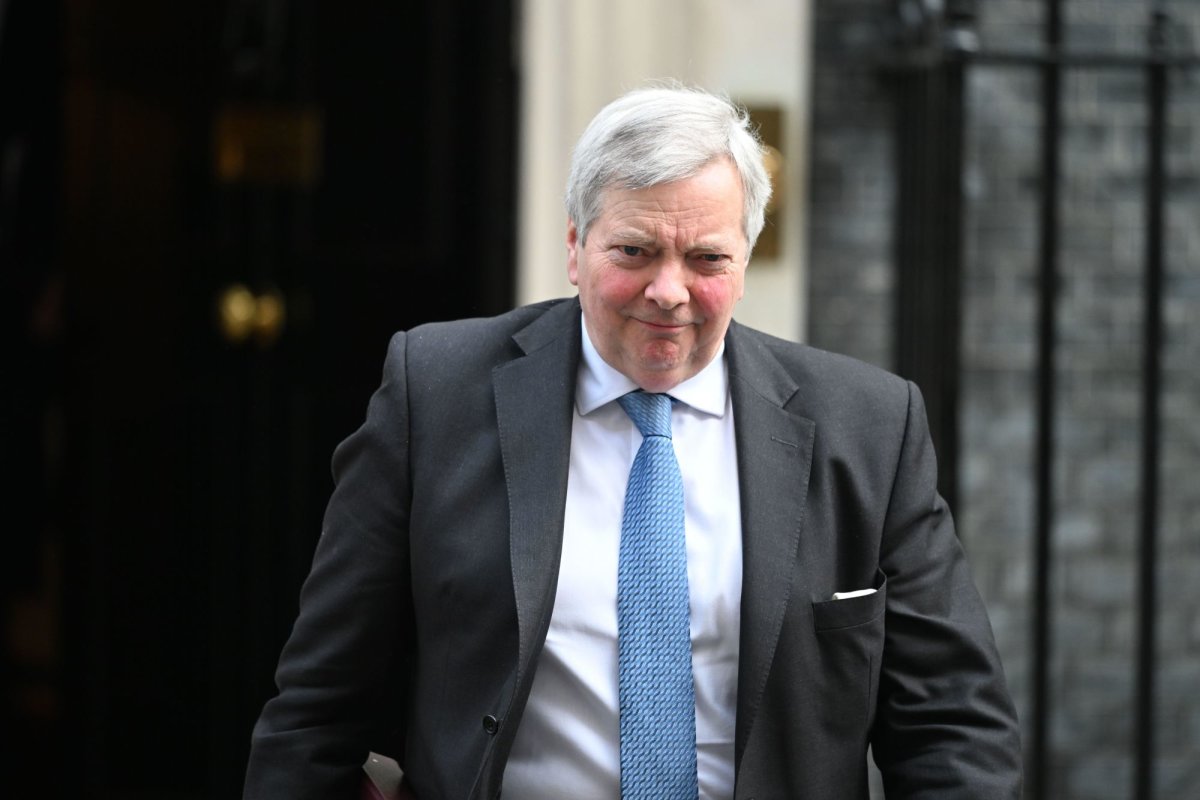

3 min read
A group of hereditary peers on Wednesday tried to make the case for why they should not be removed from the House of Lords, with one affected peer describing Labour’s reforms as “nasty”. The legislation will almost certainly pass, however.
Peers today took part in the second reading of the House of Lords (Hereditary Peers) Bill.
The legislation seeks to abolish the 92 hereditary seats in the unelected chamber.
The plan, which was part of the Labour Party’s election manifesto pledge to modernise the House of Lords, would essentially complete the reforms first put forward by former Labour prime minister Tony Blair in 1999. It is ultimately expected to become law thanks to Labour’s massive majority in the House of Commons.
However, the Bill has faced fierce opposition within the Upper Chamber, with hereditary and some non-hereditary peers keen to defend the role the former play in the parliamentary process.
Almost 100 Lords signed up to speak in the debate, including a maiden speech from Lord Brady of Altrincham, former chair of the Tory party 1922 committee.
Opposing the plans, he said it was not “immediately obvious” to him why peers like him, who were appointed to the House of Lords by a prime minister, were “inherently superior” to hereditary members.
The legislation has created tension between the Labour Government and opposition and crossbench Lords, who emphasise that the former Labour administration led by Blair had promised to keep the 92 remaining hereditary peers as a compromise.
Baroness Smith, Labour’s leader in the Lords, opened by saying the “change started” under Blair and had “still not been completed”, adding that further reform was “long overdue”.
Conservative peer Lord True, the shadow leader in the Lords, lamented that it was “sad” to hear the Bill’s arrival be met with applause by some peers. He said “that is not who we are” and “not what we should ever become”.
True said the legislation risked “destabilising” the House of Lords with “far-reaching consequences”, claiming that the 26 seats reserved for Church of England bishops would be the next to be abolished. “They will be on an exposed slope if the north wind should blow,” the Conservative peer said.
The Earl of Kinnoull, a Conservative hereditary peer, compared the UK constitution to a three-legged stool divided between the executive, legislature and judiciary, and warned that the move to scrap hereditary peers would shift the balance of power towards the executive.
He was interrupted before he started his speech. “I haven’t said anything yet,” he said, prompting laughter on the benches around him.
Other hereditary peers were less restrained.
“This is a thoroughly nasty little Bill,” said Tory peer Lord Strathcylde, “rushed through the House of Commons and brought to us with little thought about the future”.
He argued that it broke a “fundamental” and “solemn” agreement made in 1998 by the then-Blair government that the remaining hereditary peers would only be scrapped once Labour had produced an effective alternative.
““We have been waiting 25 years for that and the Labour Party has demonstrated no thought, no thinking and no progress whatever,” he complained.
Lord Falconer of Thoroton, a Labour peer, said many hereditary peers had made a “worthwhile” contribution to public life.
However, he said he wanted to remind colleagues that the debate was not about the quality of their contributions, but the principle of their remaining in the House of Lords.
Lord Grocott, a Labour peer who has long campaigned for the abolition of hereditary peers, described the compromise Tory peers reached with Blair in 1999 as “blackmail” brought about by threats to block the then-Labour government’s legislative agenda.
PoliticsHome Newsletters
PoliticsHome provides the most comprehensive coverage of UK politics anywhere on the web, offering high quality original reporting and analysis: Subscribe
Politics
‘Real pain ahead’ for Keir Starmer as Donald Trump enacts US masterplan that Ben Habib warns will ‘take Britain to the cleaners’
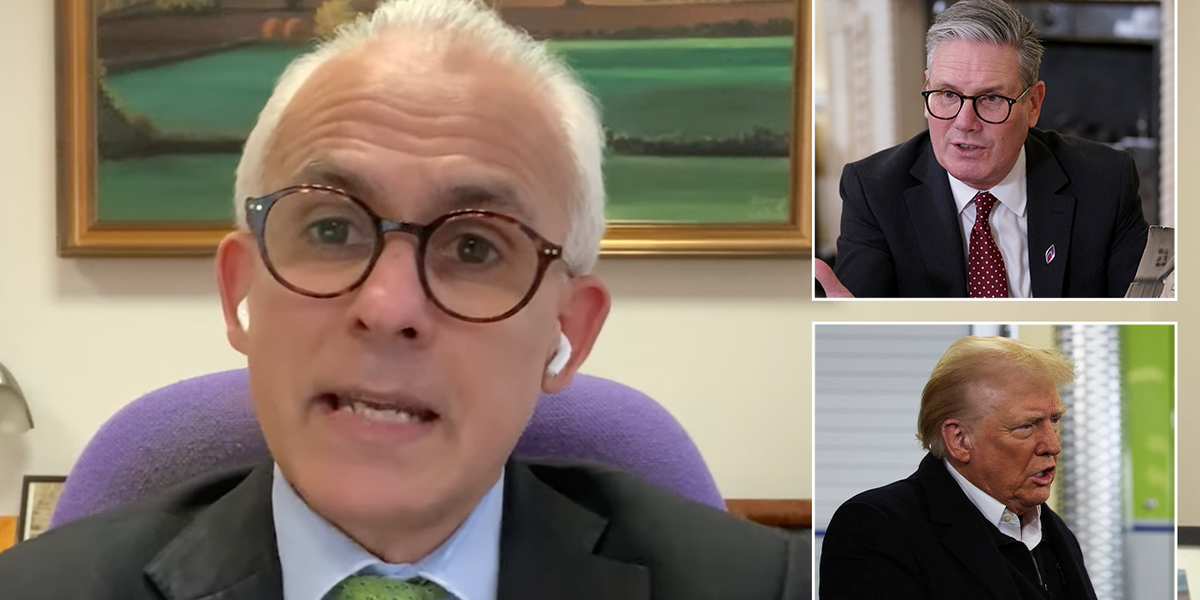
Donald Trump’s plan to prioritise America promises ‘pain’ for Great Britain, according to political commentator Ben Habib.
Speaking on GBN America, Habib said Keir Starmer should mimic the US president’s agenda to avoid being “taken to the cleaners” economically.
But the Prime Minister appears at odds with the new president ideologically and Habib has little faith in Starmer following his counterpart’s lead.
“We should have our own independent foreign policy”, Habib said on GBN America.
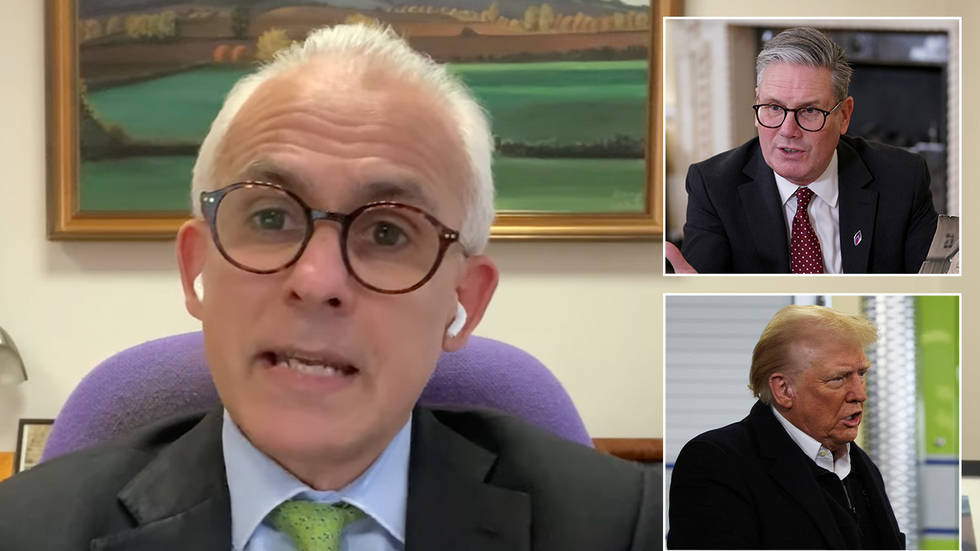
Trump’s plans could ‘send Britain to the cleaners’, Ben Habib warned
GB NEWS / PA / REUTERS
“I think what Donald Trump is doing for America is putting the US first, and there will be pain in that for the United Kingdom.
“What we’ve got to recognise, and this is on his domestic policy, is that if we don’t mimic that, we’re going to be taken to the cleaners economically.
LATEST DEVELOPMENTS
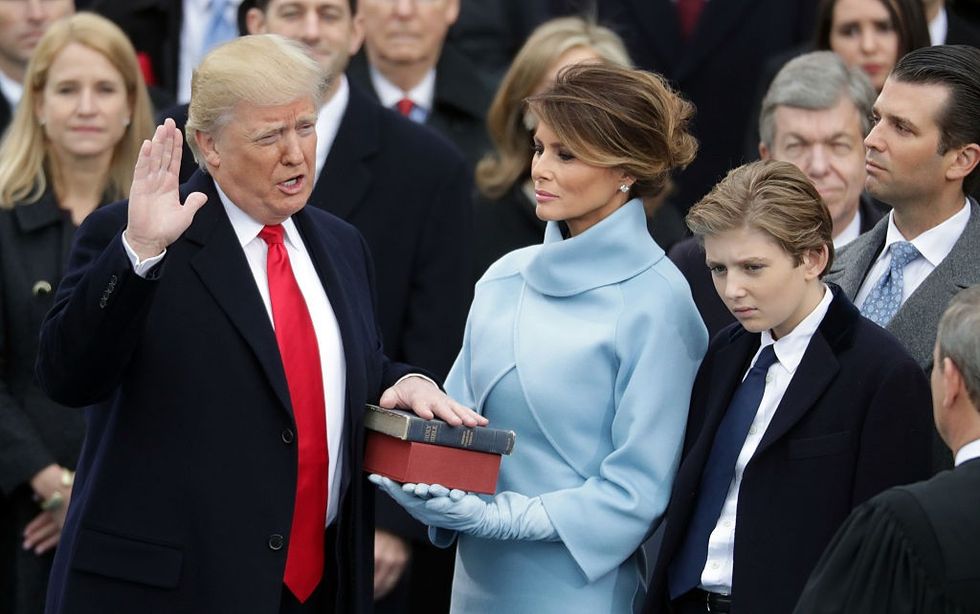 Trump takes the oath of office as his wife Melania Trump holds the bible at his first inauguration in 2017Getty
Trump takes the oath of office as his wife Melania Trump holds the bible at his first inauguration in 2017Getty“As I say, young, bright individuals will all flock to the US because it will offer them a much better home.
“This isn’t about me saying, ‘I love Trump so the UK should follow what Trump wants’, I’m saying his agenda is the right one and it will cause us real pain unless we do the same agenda.
“It also happens to be an agenda which I have been campaigning for over the last 4-5 years.”
It comes after Trump issued a stark warning to global businesses, declaring they will face tariffs if they don’t manufacture their products in the United States.
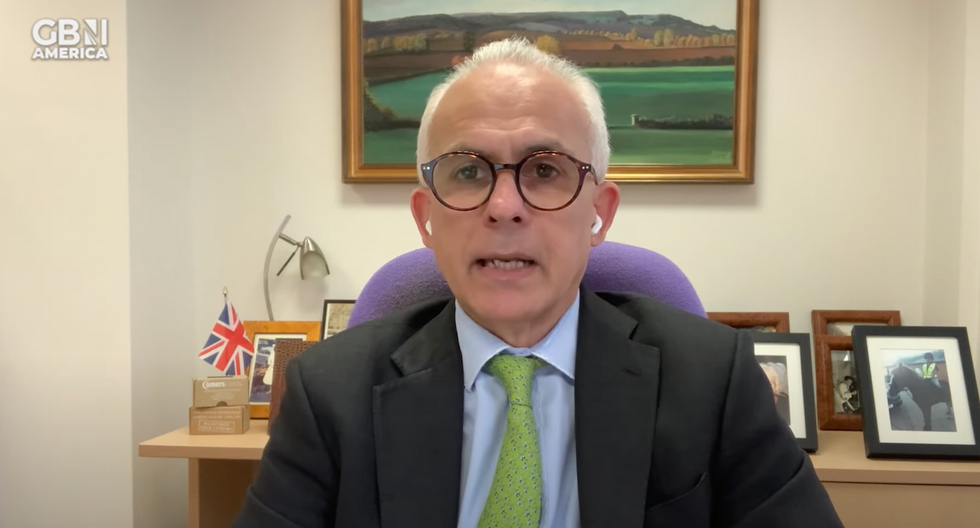
Ben Habib spoke on GBN America
GB NEWS
Speaking via videoconference at the World Economic Forum in Davos on Thursday, the US president delivered a clear ultimatum to companies worldwide.
“My message to every business in the world is very simple: Come make your product in America, and we will give you among the lowest taxes of any nation on Earth. But if you don’t, you will have to pay a tariff,” Trump said.
He announced plans to reduce the corporate tax rate from 21 per cent to 15 per cent for firms manufacturing in America.
The president specifically criticised the European Union’s regulatory system, citing his own failed real estate project in Ireland as evidence of bureaucratic obstacles to investment.
Trump also demanded NATO nations increase their defence spending to five per cent of GDP, far above the current two per cent threshold.
“I’m also going to ask all NATO nations to increase defence spending to five per cent of GDP, which is what it should have been years ago,” he told the Davos audience.
Later at the Oval Office, Trump questioned whether the US should spend anything on NATO, stating: “We are protecting them. They’re not protecting us.”
He accused the EU of unfair trade practices, claiming: “The EU does not take our farm products, does not take our cars, yet they send cars to us by the millions.”
Politics
Tories and Reform could be ‘forced to merge’ as staggering new poll puts Nigel Farage on course to become next PM
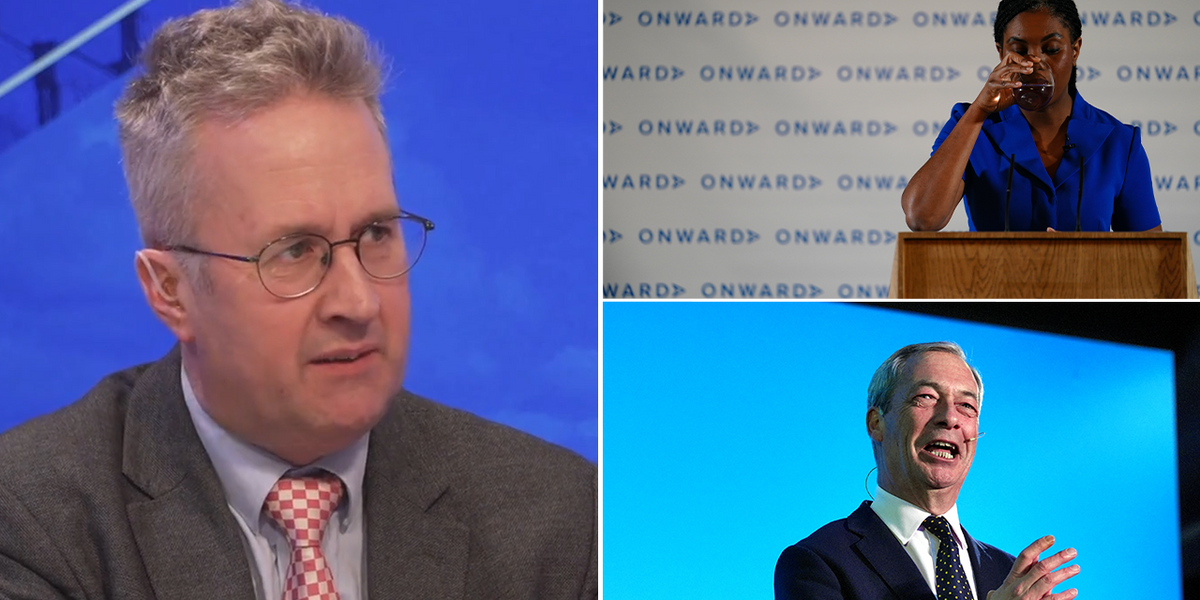
Reform UK has topped a national opinion poll for the first time, securing 26 per cent of voter support according to new data from Find Out Now.
The poll of 2,380 British adults puts Nigel Farage’s party three points ahead of Kemi Badenoch’s Conservatives at 23 per cent.
Labour trails in third place with 22 per cent, marking a significant shift in the political landscape just six months into their government.
The Liberal Democrats secured 12 per cent, followed by the Greens at 10 per cent and the SNP at 3 per cent.
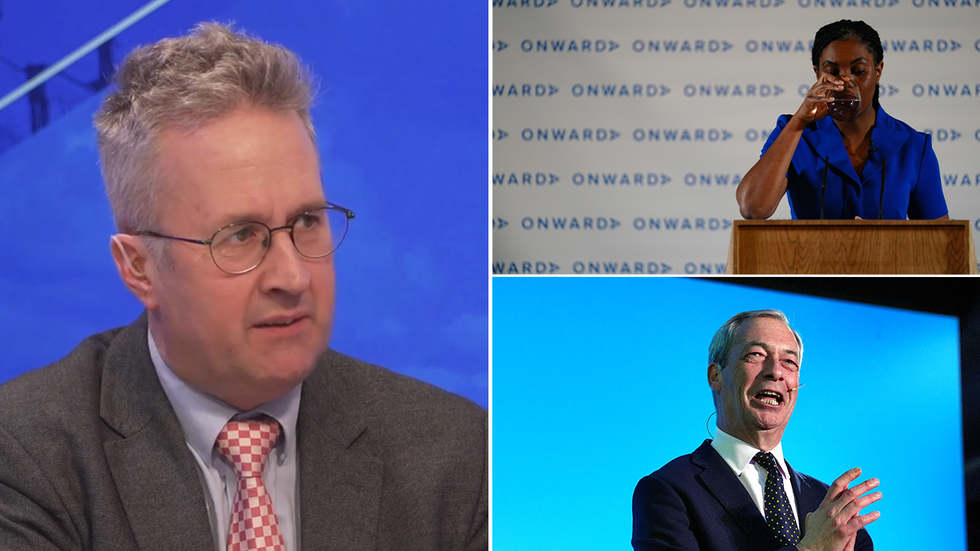
Christopher Hope offered his snap reaction to the shock polling
GB NEWS / PA
GB News Political Editor Christopher Hope suggests the poll results could force a dramatic realignment in British politics.
According to Chopper’s analysis of seat projections, Reform UK would secure 190 MPs, with Labour on 161 and the Conservatives trailing at 141.
LATEST DEVELOPMENTS
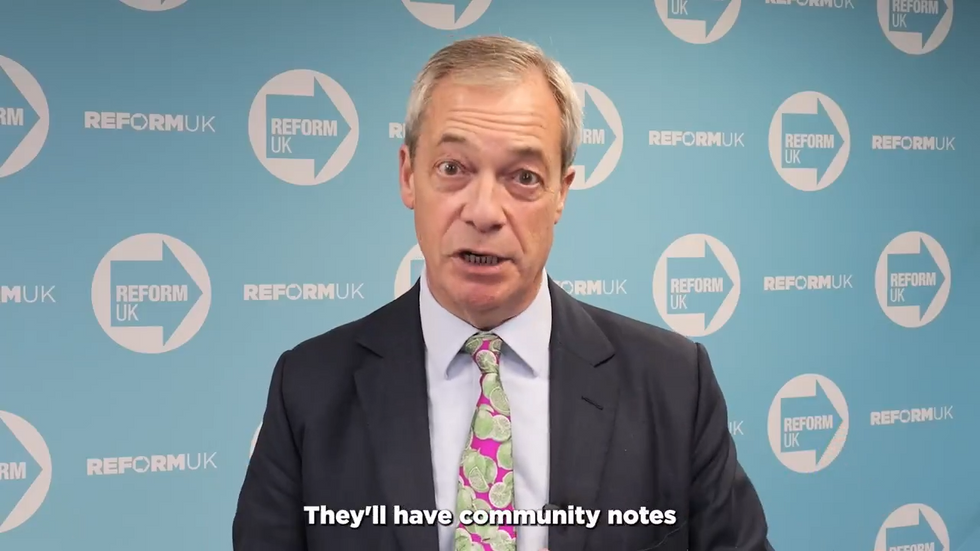
The poll of 2,380 British adults puts Nigel Farage’s party three points ahead of Kemi Badenoch’s Conservatives
X/ Nigel Farage
“It would basically force the Conservatives and Reform to merge,” Hope said, though he noted Tory leader Kemi Badenoch has previously dismissed such suggestions, questioning “why on Earth” she would merge with a party whose leader vowed to “destroy” the Conservatives.
Reform UK leader Nigel Farage responded to the poll on social media, declaring: “Reform LEADS for the first time in a national opinion poll. This is just the beginning.”
The party’s chairman Zia Yusuf firmly rejected suggestions of cooperation with the Conservatives, stating: “No pacts, no deals. Reform is headed for Government.”
Reform MP Rupert Lowe expressed confidence in the party’s trajectory, saying: “Reform now in the clear, leading a national opinion poll. I am more confident than ever that we will outright win the next general election.”
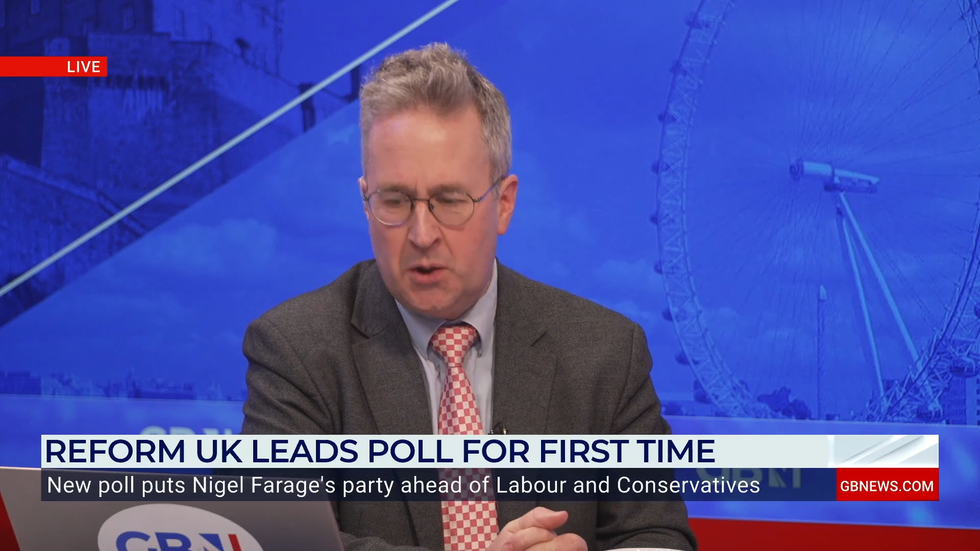
Chopper analysed the poll on GB News
GB NEWS
A Conservative spokesman for Kemi Badenoch downplayed the results, telling GB News: “Polls go up and down and change every week. We’re focused on what matters – the damage Labour is doing to the economy, our schools and our international standing.”
Labour dismissed the poll, with a party source saying they were focused on delivering their Plan for Change.
“While the opposition fight among themselves, the Labour Government is putting in the hard yards to deliver much-needed growth,” the source added.
The poll results come as Ipsos UK found confidence in the country’s direction has fallen to near pre-election levels, with 62 per cent saying the UK is going in the wrong direction.
The survey revealed widespread dissatisfaction with political leaders, with 52 per cent viewing Starmer unfavourably and 50 per cent expressing similar views about Labour.
Reform leader Farage faces his own challenges, with 51 per cent viewing him unfavourably, while 46 per cent hold negative views of Conservative leader Badenoch.
Politics
Nigel Farage rages at Britain’s ‘dismal’ ability to stop terrorists as ‘disgraceful’ Axel Rudakubana failings laid bare
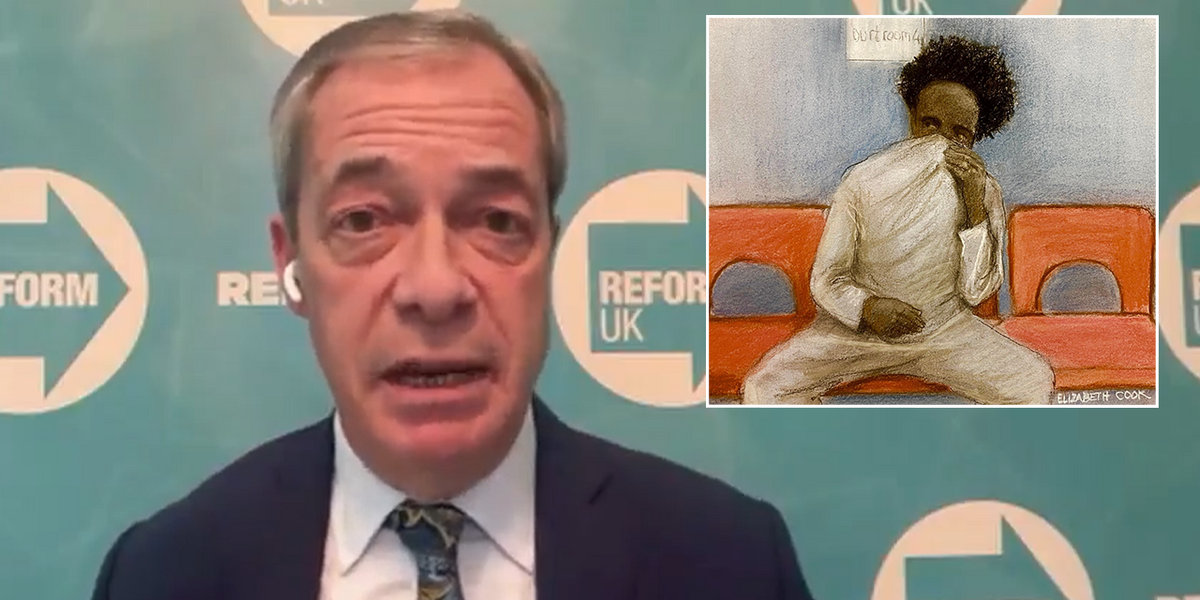
Nigel Farage has launched a scathing attack on Britain’s counter-terrorism capabilities, claiming the country’s “ability to stop terrorists is dismal”.
Speaking on GB News, the former UKIP leader criticised what he called a “cover-up” in the case of Southport killer Axel Rudakubana.
He said the Crown Prosecution Service’s decision to tell Merseyside Police not to release basic information about Rudakubana was “a real disgrace”.
“The head of the CPS, his head should roll,” Nigel declared.
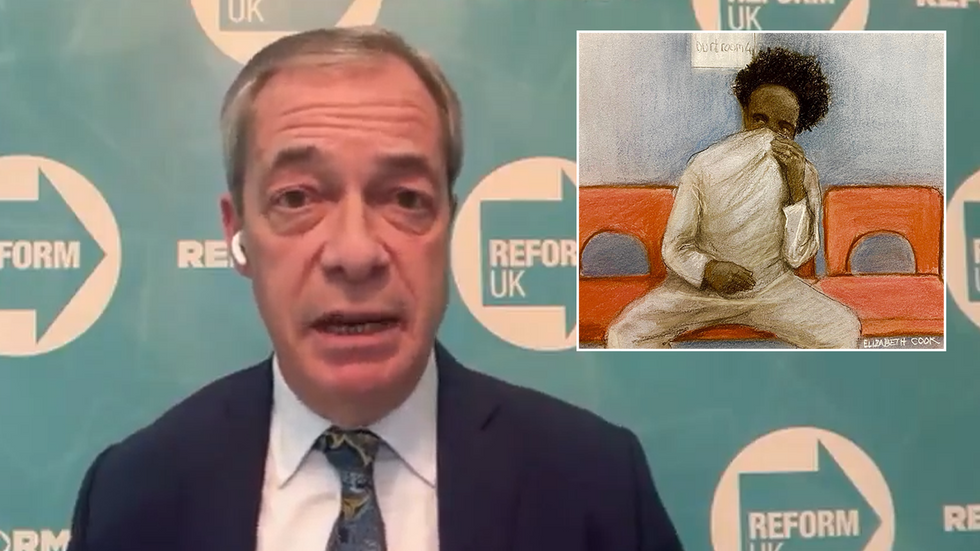
Nigel Farage hit out at the country’s failings in stopping Axel Rudakubana
GB NEWS / PA
Rudakubana had been referred to the government’s anti-extremism Prevent programme three times while at school due to his fixation with violence.
Police records show he had attacked a pupil with a hockey stick, carried knives into school and searched online for information about the London Bridge terror attack.
 Axel RudakubanaPA
Axel RudakubanaPALancashire Police were called to his home five times between 2019 and 2022 over concerning behaviour.
He was also under the care of Alder Hey Children’s Hospital’s mental health services from 2019 until February 2023, when he stopped engaging despite continued offers of support.
The 18-year-old was sentenced on Thursday to life imprisonment with a minimum term of 52 years for murdering three young girls at a Taylor Swift-themed dance class.
Rudakubana killed Bebe King, 6, Elsie Dot Stancombe, 7, and Alice da Silva Aguiar, 9, in Southport last July.
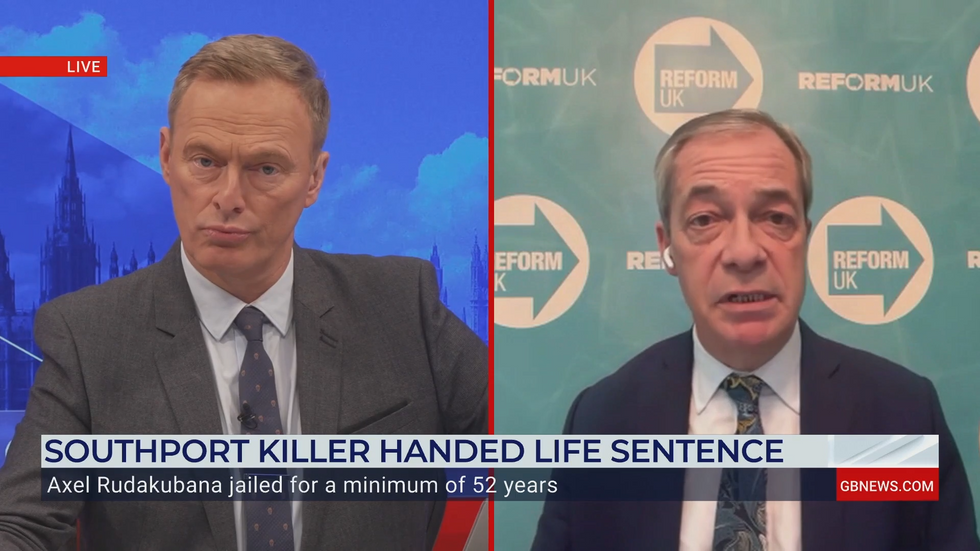
Nigel Farage spoke to Martin Daubney on GB News
GB NEWS
He also pleaded guilty to attempting to murder eight other children and two adults.
The sentence is the second-longest tariff on record in English history, after the Manchester Arena bomber’s brother.
Justice Goose said it was “highly likely” Rudakubana would never be free again.
“For daring to ask questions about this case, I got absolute vilification and hatred from senior politicians and mainstream broadcasters,” Nigel said.
He claimed both Kemi Badenoch and the Labour Party knew Rudakubana’s identity early on.
“If the public had known the truth about this guy, crazy conspiracies would not have spread online and the riots would have been nowhere near as bad,” he added.
Nigel criticised Sir Keir Starmer for only talking about “the far-right” while ignoring “evil ideologies allowed to persist within our community”.
A YouGov survey published today revealed that while 91 per cent of respondents blame Rudakubana for his actions, 70 per cent also hold counter-terrorism services responsible.
Home Secretary Yvette Cooper has ordered a “thorough review” of the Prevent referrals in this case.
A public inquiry will examine any “missed opportunities” to identify Rudakubana’s murderous intent.
The investigation remains “live”, according to Detective Chief Inspector Jason Pye, who has not ruled out further arrests in the case.
Politics
Sadiq Khan accused of ‘running down clock’ as Mayor pressed on grooming gangs
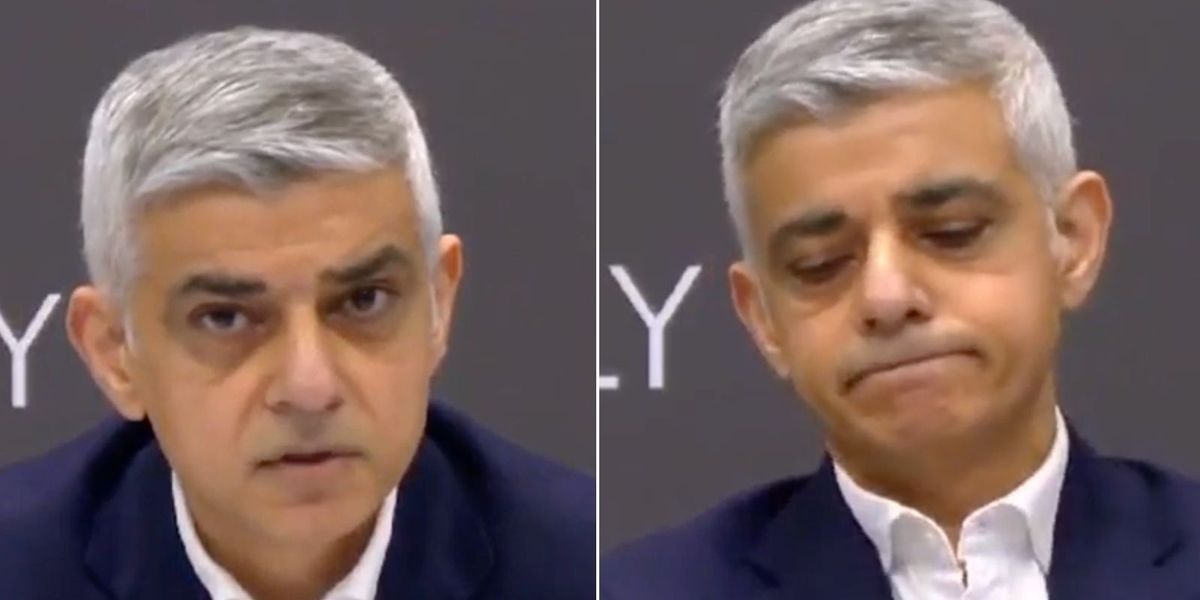
Sadiq Khan has been accused of “running down the clock” when pressed on grooming gangs in a London Assembly meeting.
The London Mayor was asked if he would guarantee some funding for police investigations into the grooming gangs scandal.
Khan said: “Firstly it’s really important when you have a conversation of this nature that you think about the victims of child sexual exploitation.”
Pressed by Susan Hall, a former London mayoral candidate, Khan said that he was “really surprised” that Hall “did not know how operational independence works” for the police.
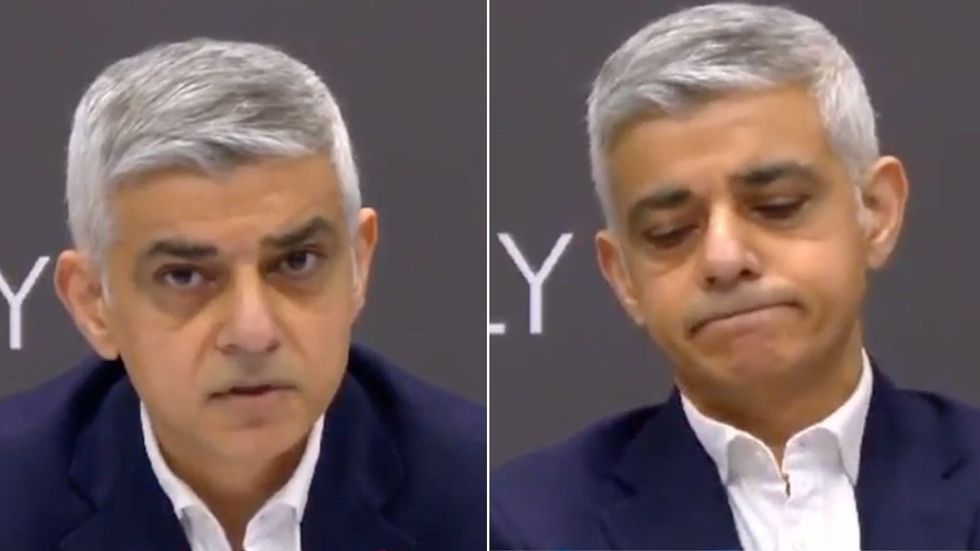
Sadiq Khan has been accused of ‘running down the clock’ when pressed on grooming gangs in a London Assembly meeting
London Assembly
Noting that she was “on a clock”, she had asked the mayor for a “yes or no” answer.
Susan Hall AM, City Hall Conservatives Crime spokesperson, said: “Yet again Sadiq has failed to answer the important questions put to him about the issues that matter to London.”
She added: “Starmer tells us local inquires are the way forward but cowardly Sadiq can’t commit to funding one, and instead cynically tries to run down the clock on the time we have to ask him questions in order to avoid answering.
“It’s a disgrace, and an insult to the victims that despite every opportunity we get to push for justice, the Mayor continues to run and hide, for shame.”
The mayor’s office was contacted for comment.
Politics
Keir Starmer left waiting by the phone as Donald Trump opts to call Saudi Crown Prince and China’s Xi Jinping instead

Sir Keir Starmer is still waiting to receive a phone call with Donald Trump following the 47th President’s inauguration on Monday.
Trump, who finally returned to the Oval Office after his thumping victory in November, has already reached out to a number of global leaders, including Saudi Crown Prince Mohammed bin Salman, El Salvador leader Nayib Bukele and Chinese President Xi Jinping.
The Prime Minister’s deputy official spokesman appeared to issue a plea for Trump to call Starmer ahead of an expected visit to Washington.
He said: “The Prime Minister would welcome the opportunity to speak to President Trump at the earliest opportunity and they had a productive meeting in September and subsequent positive phone calls in recent months and he looks forward to speaking to him soon.”
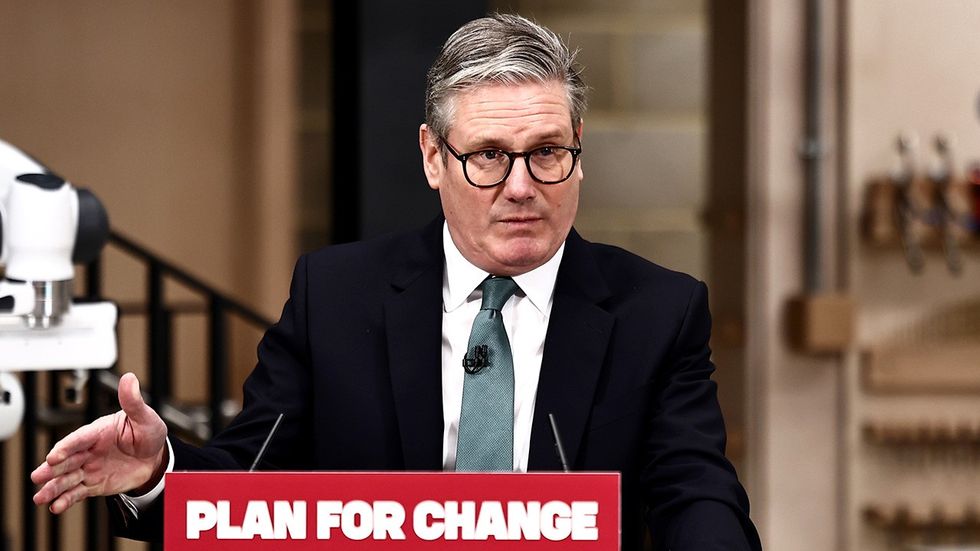 Keir StarmerPA
Keir StarmerPAWhen challenged on whether it was unusual that no phone call had taken place, the deputy official spokesman replied: “I wouldn’t accept that characterisation.
Trump’s predecessor Joe Biden spoke to then-Prime Minister Boris Johnson just three days after his 2021 inauguration.
Theresa May also jetted out to Washington within a week of Trump’s first stint in the White House in 2017, becoming the first world leader to meet the then-45th President.
However, Starmer last saw Trump for a three-hour dinner alongside Foreign Secretary David Lammy in September.
LATEST ON LABOUR’S TRUMP TENSIONS:
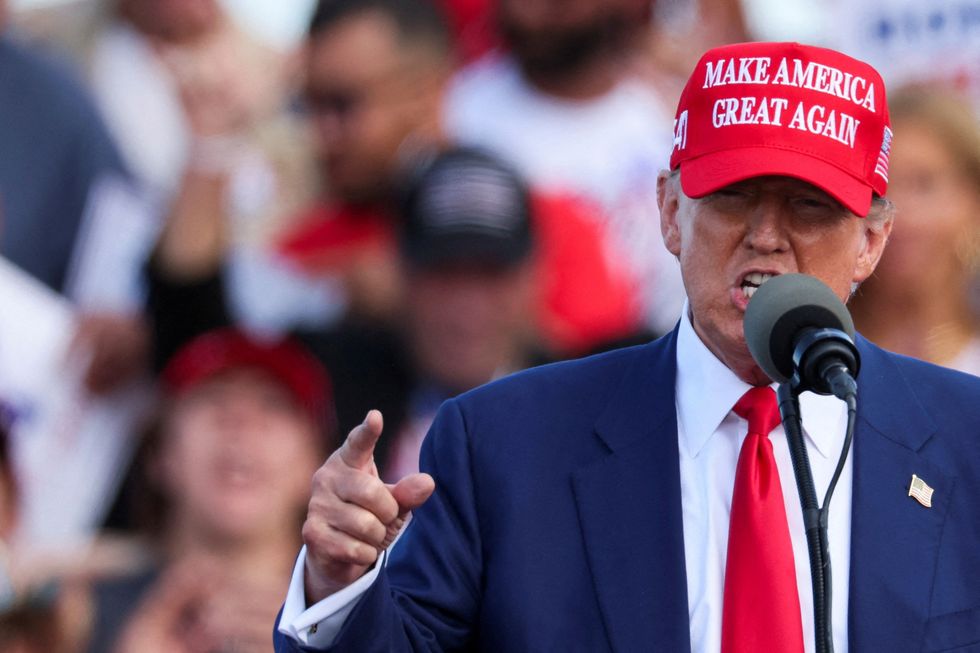 Donald TrumpREUTERS
Donald TrumpREUTERSDespite the pair calling on December 18, much has been made of the fractured relationship between Trump and Starmer’s Labour.
Lammy is among senior Cabinet figures to have significantly shifted his stance on Trump.
Having previously labelled the President a “neo-Nazi”, Lammy is now hoping to forge close ties with Trump and his Vice President JD Vance.
Trump’s allies have also suggested that the 47th President’s team could look to block Starmer’s US Ambassador pick Lord Peter Mandelson.
The rift comes after Labour staffers also attempted to help Kamala Harris campaign against Trump in key swing states.
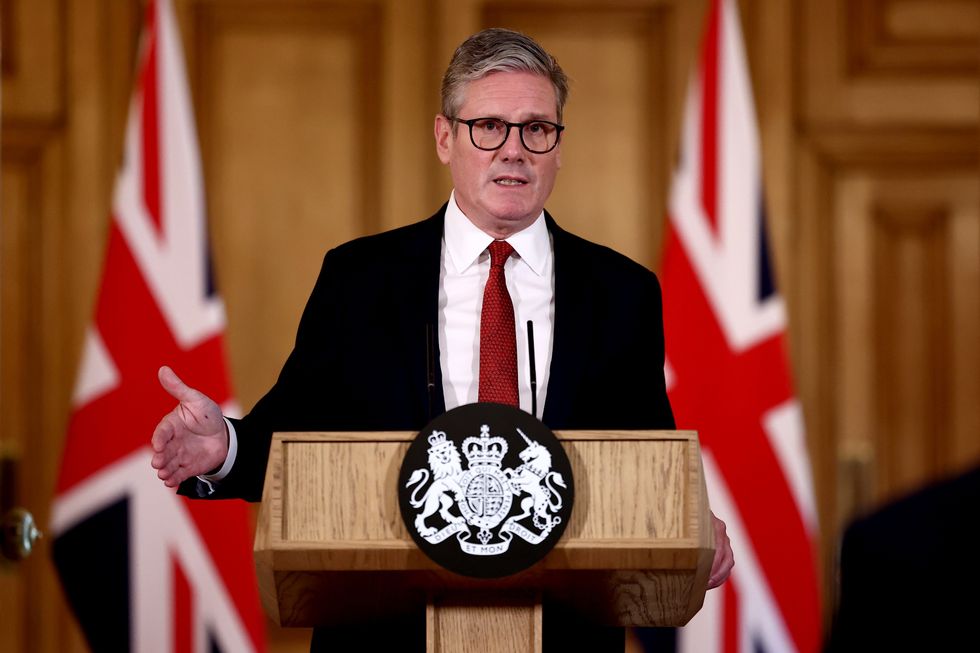 Keir Starmer revealed the details yesterday PA
Keir Starmer revealed the details yesterday PADespite their efforts, Trump won the election and filed a complaint to the Federal Electoral Commission.
Lord Glasman, who was the only Labour figure invited to Trump’s inauguration, detailed some of the challenges facing the Prime Minister.
He told PoliticsHome: “I’m obviously trying to communicate with them as best I can.
“I’m not expecting them to do cartwheels when the Prime Minister wasn’t invited, the Foreign Secretary wasn’t.
“It’s a difficult moment for them, and I’m just doing my best to represent Labour and the Government in the way that I can… They want an alliance with the UK, à la Churchill or Thatcher… They are looking for the government to be their partner, but they don’t see any indication that they are.”
Politics
I was in Washington for the inauguration. What I saw shattered Khan’s veiled attack on Trump
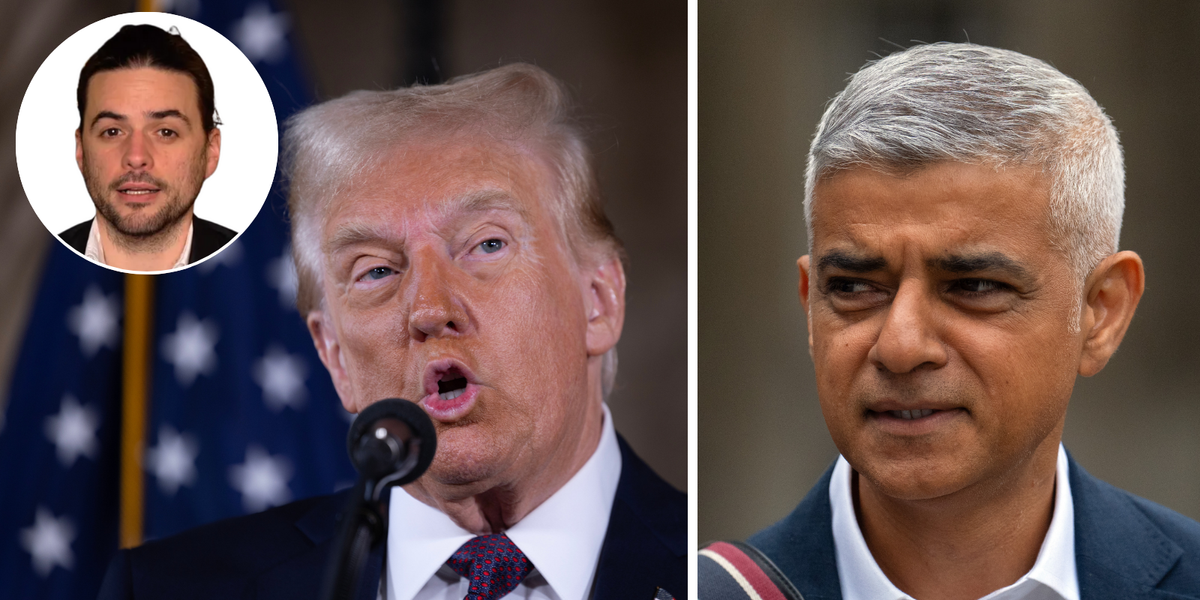
On January 20th, London Mayor Sadiq Khan plastered his social media with a series of conciliatory if not vague messages.
“We’re living in increasingly uncertain times, and I know many Londoners are concerned by what’s taking place around the world,” wrote Sadiq.
Sadiq shared a photo of himself smiling benevolently beneath a Piccadilly Circus LED screen. A screen which beams the assuring “London is and will always be a place for everyone”.
Now cynics will say he has deliberately timed these with Donald Trump’s second inauguration as President of the United States. Kahn’s critics will say this is just more vacuous virtue signalling from Mr Kahn.
They’ll bemoan his pronouncements as typical progressive platitudes. They will seethe that our “DEI” Mayor is making allusions to geopolitics when violent crime, knife crime and rape and sexual offences have all risen under his mayorship.
But not I! Unlike those critics, I will give our great leader the benefit of the doubt. But what could he possibly be alluding to?
In Washington D.C. recently, still buzzing and high from Donald Trump’s victory rally at the Capitol One Arena on Sunday, I racked my brains.
Sadiq would’ve loved it. The Village People, chaps, tashes and leather. They tore the roof off. It was old-school diversity. Turbo-diversity. When DEI and S&M went cock in hand. Sadiq “Diversity is our greatest strength” Kahn would’ve been shaking his little booty with joy.

Donald Trump won the election in a landslide victory
Reuters
He can’t have been referring to Trump’s America.
What could it be? When I lay back in my hotel room, the sound of cacophonous patriotism bouncing up from the streets below, I tried to find answers on the tele.
Israel ceasefire and hostage deal agreed upon, including a British hostage. Soon-to-be-Sir Sadiq must have been overjoyed.
This is what Sadiq’s has been tweeting about for the last year and a half. A deal forced through by Trump, according to Benjamin Netanyahu anyway.
Sadiq is no doubt thrilled by the immediate impact by America’s returning Commander-in-chief.
He couldn’t have been referring to Trump’s America.
LATEST MEMBERSHIP OPINION:
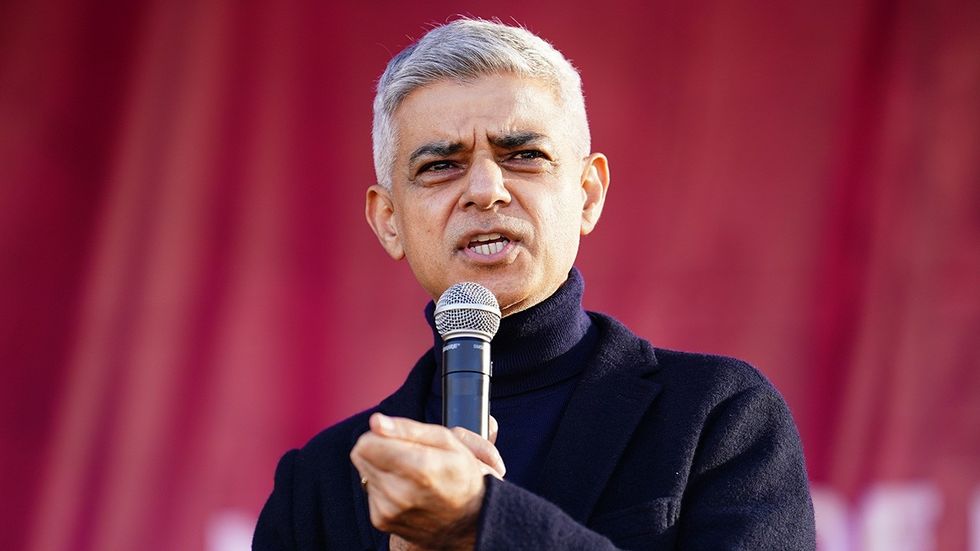 London Mayor Sadiq Khan has been awarded a knighthood in this year’s Honours ListPA
London Mayor Sadiq Khan has been awarded a knighthood in this year’s Honours ListPAAfter all, thanks to exposure by Elon Musk, Britain’s Pakistani rape gangs scandal – where our country’s most vulnerable children who have been abused, tortured and in some cases brutally murdered – has been given global attention at last.
Thanks to Trump’s team, the American media and X, we in Britain are being nudged towards justice for the girls. No doubt Sadiq will be thrilled.
He can’t have been referring to Trump’s inauguration. After all, a majority of American-Muslims voted for Trump in opposition to the Democrat’s disregard for traditional family values and chaotic foreign policy which has left the middle east, and Eastern Ukraine in rubbles.
When I watched the swearing in ceremony beneath the Capitol building Rotunda, I laughed to myself. Those silly critics probably think Khan was referring to this. Silly them.
Prayers from both a Rabbi and Pastor Lorenzo Sewell from Detroit. A glorious display of America’s founding mantra “E Pluribus Unum” – of the many one.
A mantra that celebrates diversity but recognises unity as more important. I know Sadiq loves Diversity, but are you to tell me the idea of unity would offend him? Surely not.
Now I can’t tell you exactly what he was referring to. But I for one have no reason to believe those posts have anything to do with the return of Donald J. Trump to The White House.
A celebration of diversity, unity, democracy, and patriotism. A rejection of Biden’s disastrous foreign policy and, one hopes, a return to Trump’s first term of relative global peace.
I tell you what. I’ll come back to you.
Politics
Nigel Farage says he’s ready to be next PM and vows to save ‘miserable’ Britain as Reform UK snatch lead in shock poll: ‘You bet your life!’
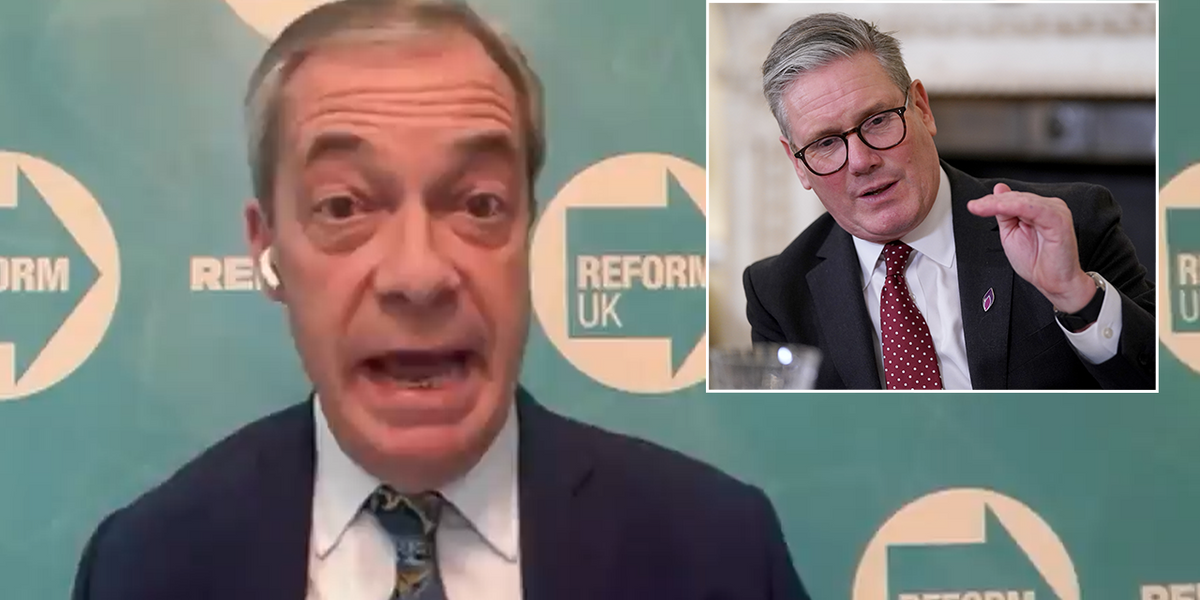
Reform UK leader Nigel Farage says he is ready to become the next Prime Minister of Great Britain after a new poll put his party ahead of Labour and the Conservatives.
Speaking on GB News, Nigel said the country is engulfed by a ‘miserable’ atmosphere, a stark contrast to what we are seeing across the pond.
This is a breaking story, more to follow.
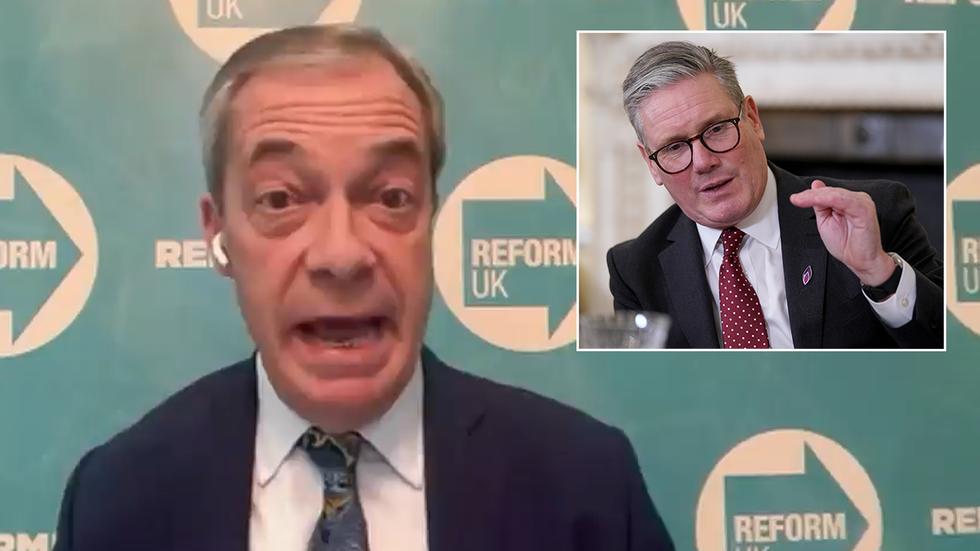
Farage says the British public has lost faith in the ‘uniparty’
GB NEWS / PA
Politics
MPs Push for More Time to Debate Voting Reform
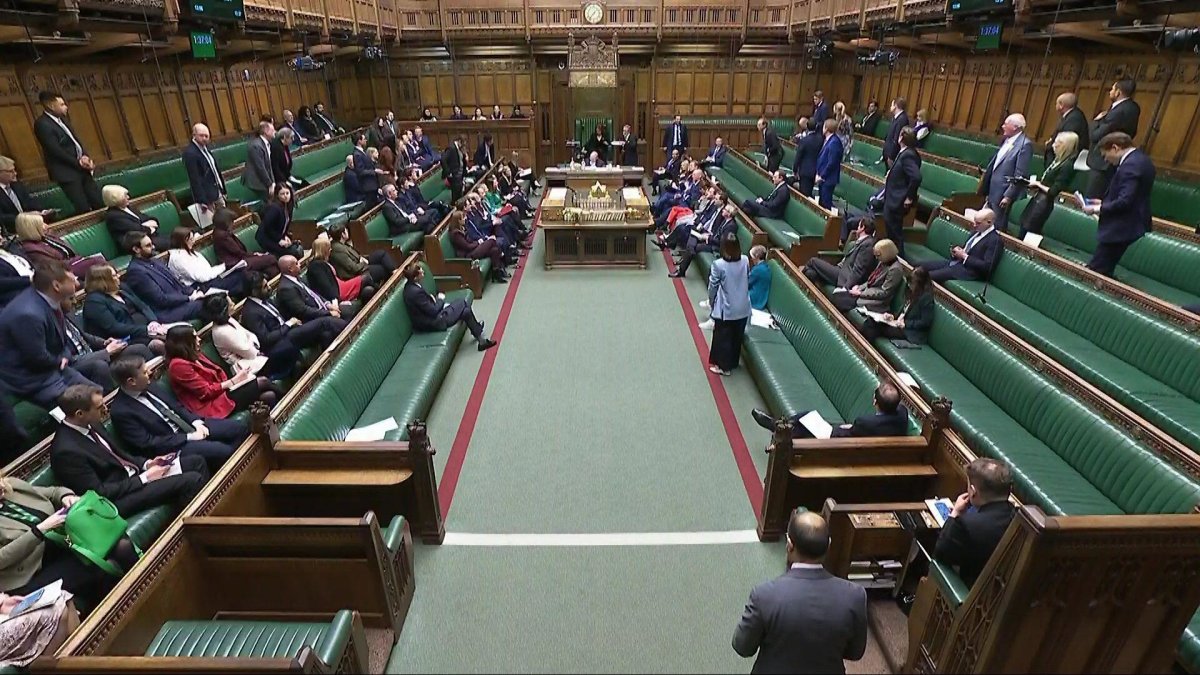

(Alamy)
3 min read
The Lib Dems have urged the Government to provide them with more time to debate Parliamentary reform as momentum builds to change the UK’s voting system.
The Elections (Proportional Representation) Bill won a vote in the House of Commons during its first reading in December by 138 votes to 136. It narrowly passed with the support of 59 Labour MPs.
It was the first time MPs had endorsed replacing the current First-Past-The-Post (FPTP) for Proportional Representation (PR).
A minority of private members’ bills become law, because they are put forward by backbenchers and not the Government. They face competition from other MPs’ private members bills and may never receive a second reading.
Sarah Olney, Lib Dem MP for Richmond Park, said the Labour Government should “finally listen to the public” and give the Bill the time it needs to be scrutinised and debated in the chamber.
“Winning a vote in Parliament on proportional representation was a victory for democracy and for members of the public everywhere. They deserve their rightful say and for their vote to count,” she said.
“It’s long been clear that First Past the Post is not fit for purpose. The 2024 election was the most disproportionate in history, with a government winning two-thirds of the seats on one-third of the vote.
“The Labour Government needs to finally listen to the public, and give my Bill the time and support it needs to progress through Parliament and into law. Anything less would be an insult to everyone whose vote was effectively wasted at the last General Election.”
Keir Starmer is open to electoral reform having promised to give 16-year-olds the vote at the next election in his party’s manifesto in 2024.
The Prime Minister came under renewed pressure from his own party in November when Labour MPs joined a parliamentary group calling for the UK to move to a proportional voting system.
Many Labour MPs and activists are sympathetic to electoral reform, after a motion to commit the party to proportional representation passed at its 2022 conference.
However, the Prime Minister’s team have ruled out any action or commitment for the first term of a Labour government.
The UK held a referendum in 2011 on whether Westminster elections should use Alternative Voting (AV), where voters rank candidates in order of preference.
The ‘No’ to AV campaign won more than two-thirds of the vote with a turnout of 42 per cent.
Research from YouGov has found voters 48 per cent of respondents are in favour of adopting proportional representation, compared to 24 per cent who oppose it and 29 per cent who are unsure.
At the last election Labour won the second largest majority in political history after it secured 412 seats with 33.8 per cent of the vote.
If the voting system was based on PR, instead of FPTP, Labour would have only won 228 seats.
The Conservatives would have gained 139 seats while Reform would have won 100, the Lib Dems 73 and the Greens 71.
The Government was approached for comment.
PoliticsHome Newsletters
PoliticsHome provides the most comprehensive coverage of UK politics anywhere on the web, offering high quality original reporting and analysis: Subscribe
Politics
Reform UK pulls ahead of both Labour and Tories as Nigel Farage dominates in new poll
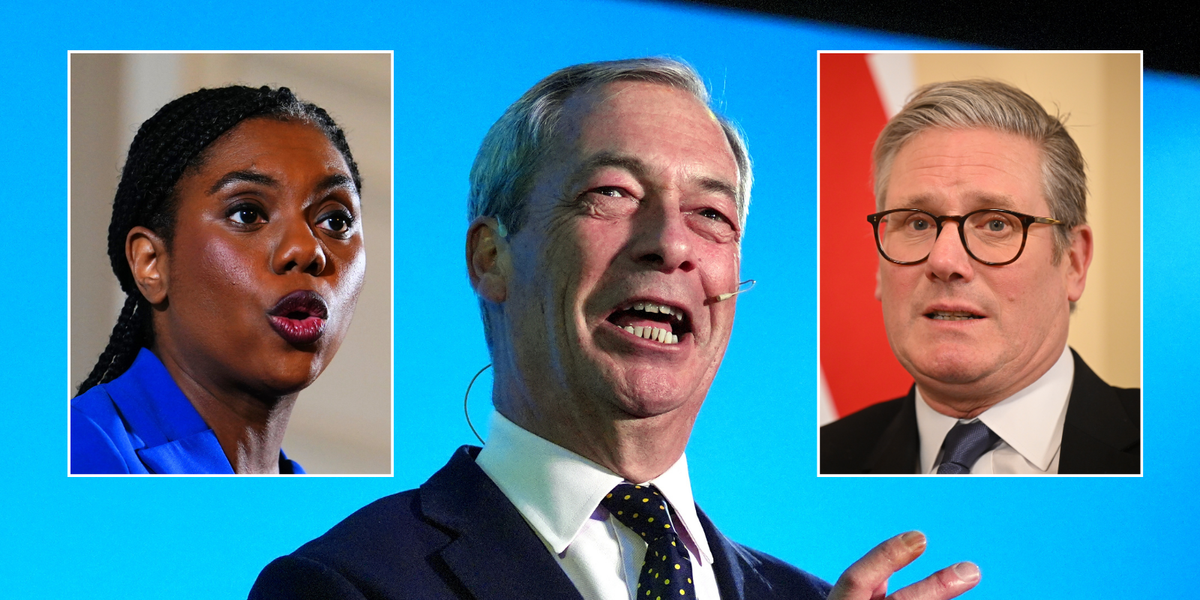
Reform UK has pulled ahead of both Labour and the Conservatives to top a national poll alone for the first time ever.
Fresh data from pollsters at Find Out Now has placed Nigel Farage’s party three points clear of the Tories – while Labour has slipped to a distant third.
Some 26 per cent of Britons would now vote for Reform if a General Election were called tomorrow, the data says – with 23 per cent opting for Kemi Badenoch’s Conservatives, and 22 for Labour.
In a defiant statement quashing calls for a pact between Reform UK and the Tories, the former’s chairman Zia Yusuf said on social media: “No pacts, no deals. Reform is headed for Government.”
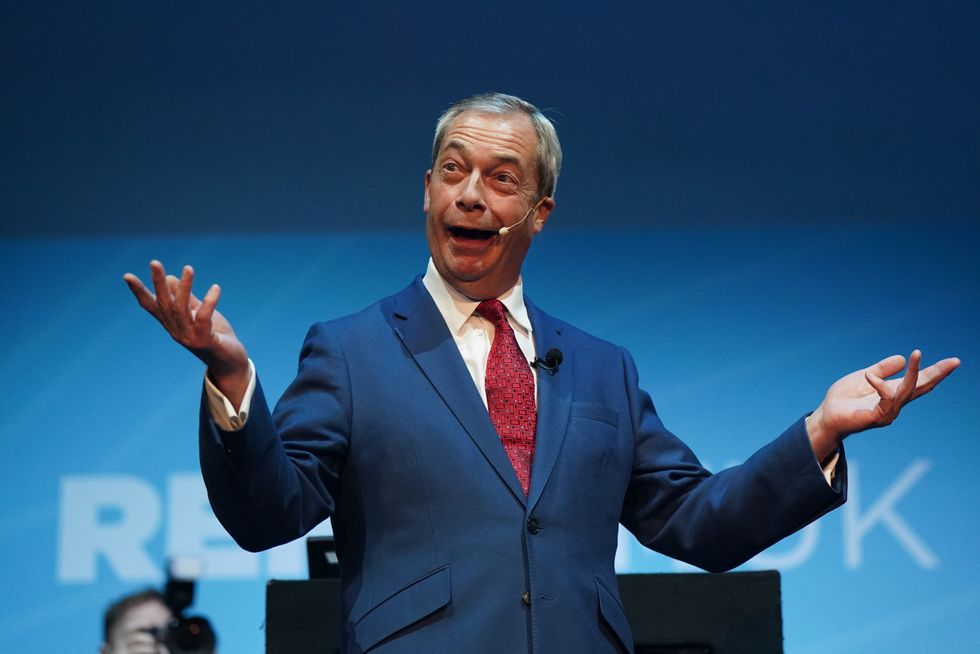
Some 26 per cent of Britons would now vote for Reform if a General Election were called tomorrow
PA
While leader Nigel Farage said: “Reform LEADS for the first time in a national opinion poll. This is just the beginning.”
And Reform’s Great Yarmouth MP Rupert Lowe added: “Reform now in the clear, leading a national opinion poll.
“I am more confident than ever that we will outright win the next general election – it is going to happen. It cannot come soon enough.”
But the Tories have poured cold water on the figures – a spokesman for Kemi Badenoch told GB News: “Polls go up and down and change every week.
LATEST ON REFORM UK:
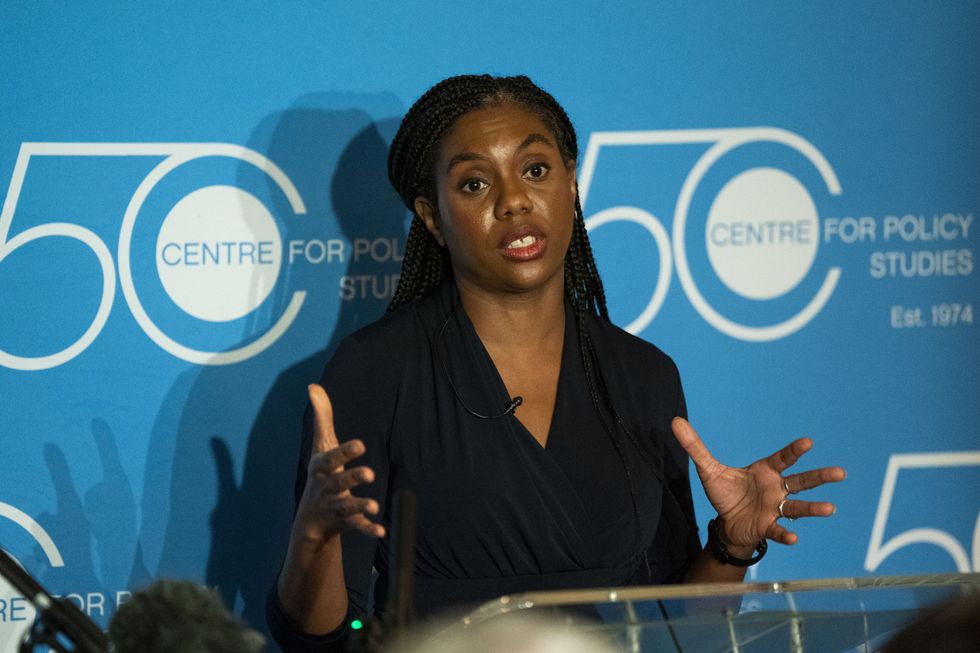
Kemi Badenoch’s Tories have poured cold water on the figures
PA
“We’re focused on what matters – the damage Labour is doing to the economy, our schools and our international standing.”
And Labour has accused the two right-wing parties of “fighting among themselves”.
A Labour source said: “The Labour Government is getting on with delivering the Plan for Change. We’ve been clear from the outset that means taking the tough decisions needed to undo 14 years of Tory chaos and decline.
“While the opposition fight among themselves, the Labour Government is putting in the hard yards to deliver much-needed growth, create more jobs, make people better off by putting more money in people’s pockets, rebuild Britain and get our NHS back on its feet.”
It comes just weeks after Find Out Now placed Reform UK neck-and-neck with Labour – the first time Nigel Farage’s party had topped a national poll.
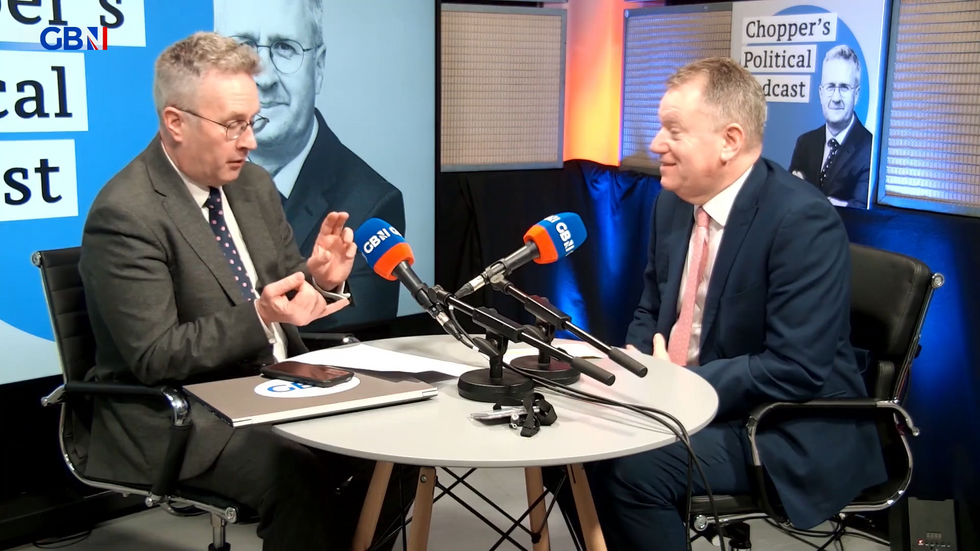
Before the new polling emerged, Tory peer Lord Frost had warned that his party would have to come to some sort of arrangement with Reform
GB NEWS
Back then, Refom and Labour jointly led with a 25 per cent vote share each, with the Conservatives left with 20 per cent.
But after a fortnight of gloomy headlines for the Labour Government, voters appear to be turning away.
Reform UK has gained one percentage point, the Tories three, and the Liberal Democrats one – all while Labour has sunk by three per cent.
Before the new polling emerged, Tory peer Lord Frost had warned that his party would have to come to some sort of arrangement with Reform if neither can come out on top.
And he looks to be vindicated by the data – running the Find Out Now results through an Electoral Calculus projection would see Reform take 170 seats, the Tories 165 and Labour 179, raising the prospect of a Reform-Tory coalition Government.
Politics
Is Donald Trump about to invite King Charles to the White House?
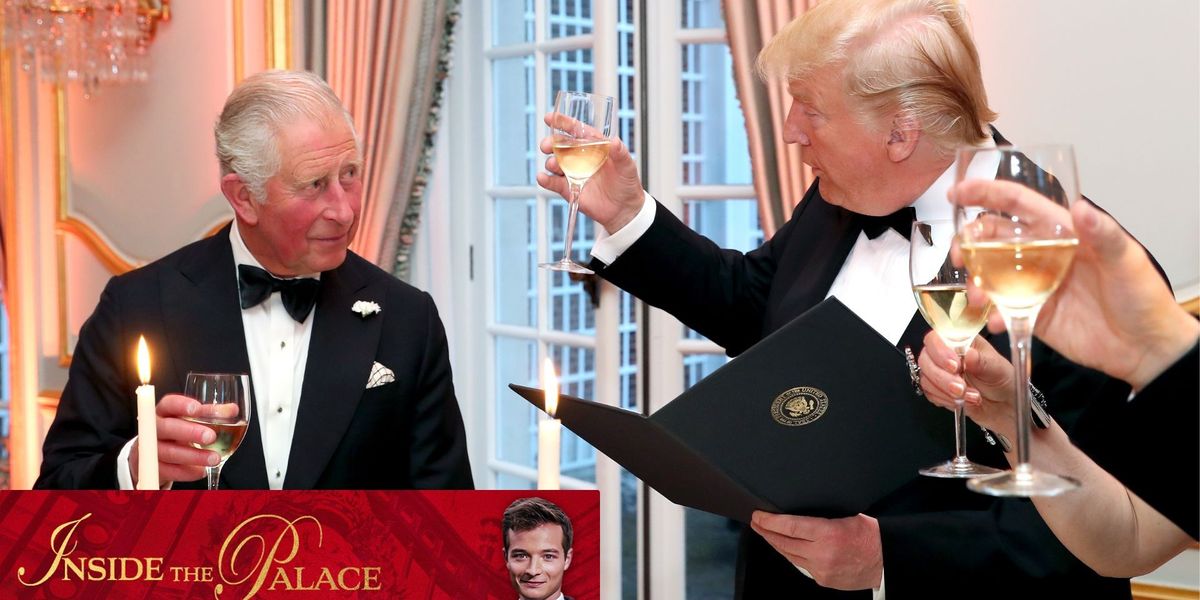
GB News’ Royal Correspondent Cameron Walker has provided his exclusive insight into engagements undertaken by Prince William, King Charles and the Princess of Wales this week.
Sign up to the GB News Royal Newsletter to get the latest analysis straight to your inbox.
IS TRUMP ABOUT TO INVITE THE KING TO THE WHITE HOUSE?
On Monday, President Donald Trump was sworn in as the 47th President of the United States of America.
The relationship between Sir Keir Starmer’s Labour Government and the new Republican President, however, is (at best) rocky.
But Britain has a ‘Trump’ card – The Royal Family – and The President is known for his pro-monarchist tendencies.
Good trade (without eyewatering tariffs) and diplomatic relations between the United Kingdom and the United States could prove essential in an increasingly volatile world.
Is it any wonder, therefore, that a Downing Street source told The Times this week that the government is planning for a senior royal to visit the United States to renew the “special relationship”?
Buckingham Palace confirmed on Monday that The King sent a personal message to President Trump on his inauguration, reflecting on the enduring special relationship between the UK and USA.
Members of the Royal Family have soft power to strengthen relationships between two countries in a way which politicians will never be able to do; royals have to remain politically neutral.
I understand the option of a State Visit to the U.S. remains firmly on the table, as does the possibility of The King inviting President Trump to London.
A source insists that there are no dates in the diary yet, and any visit would be subject to advice from the Foreign Office.
The Times reports 2026 is the most likely option for an outward State Visit to Washington.
If I was a betting man, I would perhaps place a bet on The Prince and Princess of Wales – if Catherine is well enough.
This is because Prince William met President Trump in Paris last year, and Trump remarked “he looks better in person” as he beamed with delight.
A royal source previously branded William a “global statesman”, and his popularity in the United States (despite his brother’s personal attacks) could be something the UK Government could capitalise on.
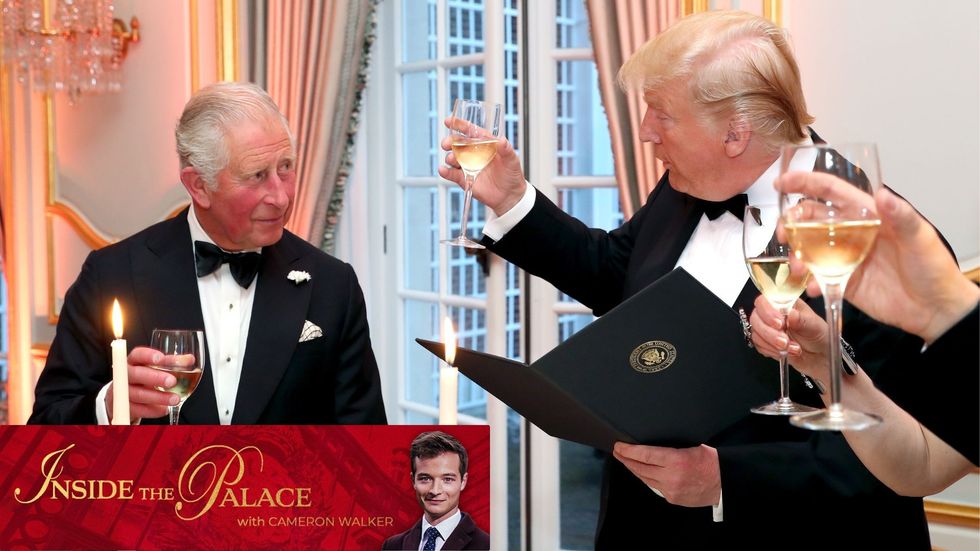
Buckingham Palace confirmed on Monday that The King sent a personal message to President Trump on his inauguration, reflecting on the enduring special relationship between the UK and USA.
Getty
WILLIAM BACK IN THE BOXING RING?
On Tuesday, The Prince of Wales visited Centrepoint’s Ealing service to meet young people being supported by the homeless charity.
2025 will mark 20 years of Prince William being the charity’s Patron, having made secret visits as a boy with his mother Diana, Princess of Wales.
During the engagement, he played table football and boxed with young people experiencing homelessness.
He appeared to thrive during boxing drills, saying: “It might get me back into boxing, you never know”.
I hear The Prince of Wales has, in the past, taken to the boxing ring: all be it “briefly” and “not properly”.
At Centrepoint, each young person (16 – 25) is provided with a home, employment and education opportunities, as well as counselling.
I understand The Prince really enjoyed meeting the young people – especially hearing their personal stories of why they needed support.
For example, he met 24-year-old Bethany who was in care as a child – she fell pregnant aged 17.
She “pushed through” with the help of Centrepoint, and earned a degree from the London School of Economics (LSE) and now works in local government.
In 2023, The Prince of Wales launched ‘Homewards’ – a five year plan to demonstrate homelessness can be ended in the UK, making it rare, brief and unrepeated.
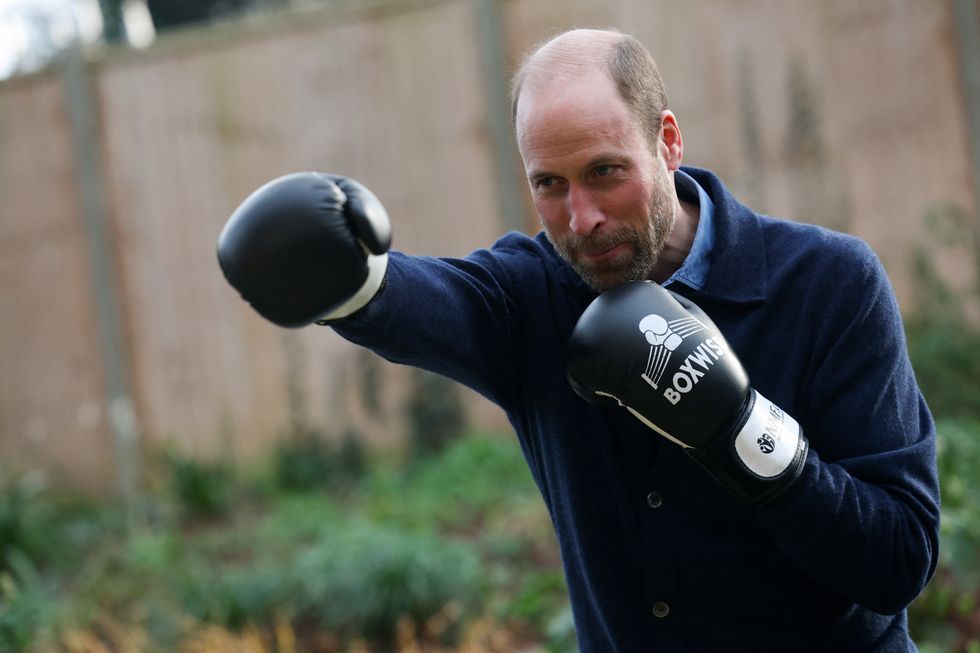
On Tuesday, The Prince of Wales visited Centrepoint’s Ealing service to meet young people being supported by the homeless charity.
Getty
WHAT PRINCE HARRY’S UNCLE TELLS US ABOUT ROYAL FAMILY RELATIONS
The Duke of Sussex has settled out of court with News Group Newspapers (NGN) over alleged unlawful information gathering at both The Sun and the now-defunct News of the World.
NGN has offered Harry an “unequivocal apology” for the intrusion into the private lives of himself and his late mother, Diana, Princess of Wales.
It is the first time The Sun newspaper has ever admitted liability for their use of private investigators to carry out unlawful information gathering, but the title has always denied phone hacking.
Prince William and Harry’s uncle, Earl Spencer, has now made a rare public statement: “It takes an enormous amount of guts to take on opponents like News Group Newspapers, and a great tenacity to win. And it’s just wonderful that Harry fought for – and gained – an apology to his mother. She would have been incredibly touched at that and rightly proud.”
It is incredibly telling that Diana’s brother has gone on the record to defend, and praise, his nephew’s tenacity.
Following the late Princess’ tragic death in a Paris car crash, during a paparazzi chase, Earl Spence accused British newspaper editors of having “blood on their hands”.
It appears Prince Harry and his uncle could share the same resentment towards British tabloids, and shows their bond is still strong, despite Harry’s fallout with the Royal Family over ‘Megxit’.
I understand Prince Harry is still not on speaking terms with his brother, Prince William, and has limited contact with The King.
Kensington Palace and Buckingham Palace declined to comment on Prince Harry’s legal settlement.
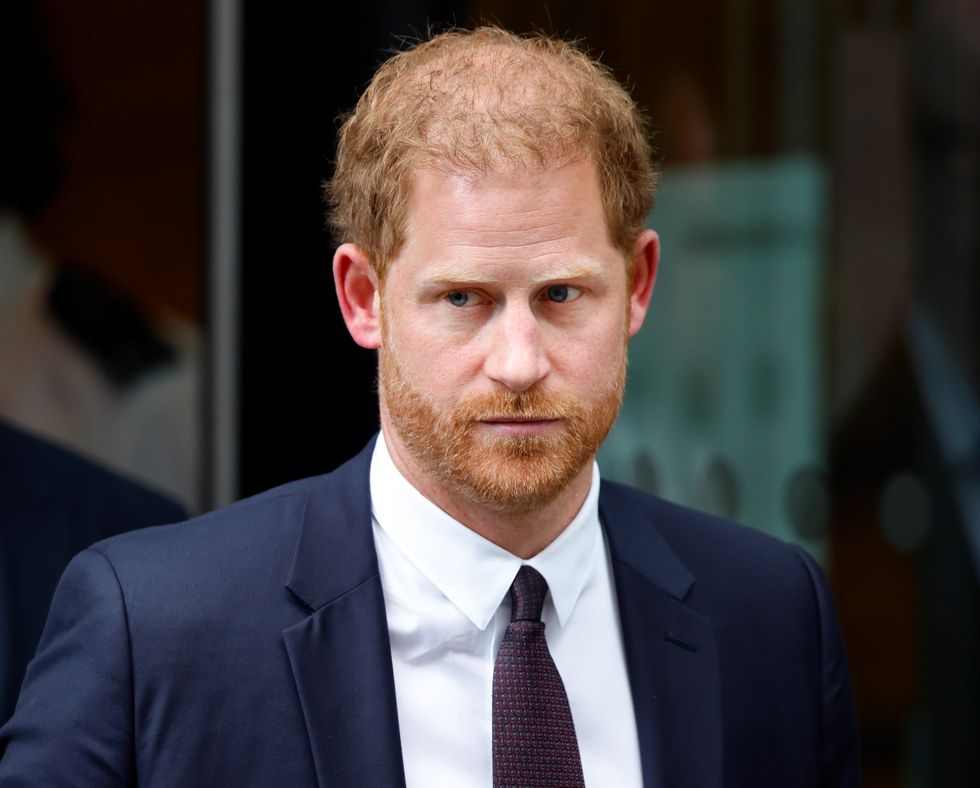
The Duke of Sussex has settled out of court with News Group Newspapers (NGN) over alleged unlawful information gathering at both The Sun and the now-defunct News of the World.
Getty
KING’S SECRET DINNERS WITH THE GRENADIER GUARDS
Yesterday, I attended the Grenadier Guards’ inspection at their barracks near Aldershot.
On Monday, they take up Ceremonial Public Duties for The King at Buckingham Palace, Windsor Castle, The Tower of London and St James’s Palace.
For the last five years, these battle-hardened soldiers have been deployed on operational combat duties.
With a few minor tweaks, ordered by the Brigade Major of the Household Division Lieutenant Colonel Charles Foinette, they will achieve ‘ceremonial perfection’ by Monday’s ceremonies.
He tells me: “The things we tend to be commenting on are things like fit of uniforms, where perhaps some tailoring adjustment is required, or, in 1 or 2 cases, where [bearskin caps] are perhaps a little bit beyond their design life and are going a funny colour, or could fit better. So it’s really about providing the appropriate support to make sure that the soldiers and indeed the battalion, get the support they require to perform to the highest standard.
The Grenadier Guards have a particularly close bond with King Charles, who I understand often has private dinners with them. His Majesty is the Company Commander of the King’s Company Grenadier Guards – one of the oldest regiments in the British Army They have been on duty inside Westminster Abbey at every coronation since King Charles II was crowned, following the restoration of the monarchy in 1660 They were originally formed from loyal bodies of men who remained close to, and trusted by, The King throughout his exile in Bruges – his father, Charles I, was executed in 1649.
-

 Fashion8 years ago
Fashion8 years agoThese ’90s fashion trends are making a comeback in 2025
-

 Entertainment8 years ago
Entertainment8 years agoThe Season 9 ‘ Game of Thrones’ is here.
-

 Fashion8 years ago
Fashion8 years ago9 spring/summer 2025 fashion trends to know for next season
-

 Entertainment8 years ago
Entertainment8 years agoThe old and New Edition cast comes together to perform You’re Not My Kind of Girl.
-

 Sports8 years ago
Sports8 years agoEthical Hacker: “I’ll Show You Why Google Has Just Shut Down Their Quantum Chip”
-
Business8 years ago
Uber and Lyft are finally available in all of New York State
-
Entertainment8 years ago
Disney’s live-action Aladdin finally finds its stars
-
Sports8 years ago
Steph Curry finally got the contract he deserves from the Warriors
-
Entertainment8 years ago
Mod turns ‘Counter-Strike’ into a ‘Tekken’ clone with fighting chickens
-
Fashion8 years ago
Your comprehensive guide to this fall’s biggest trends





You must be logged in to post a comment Login